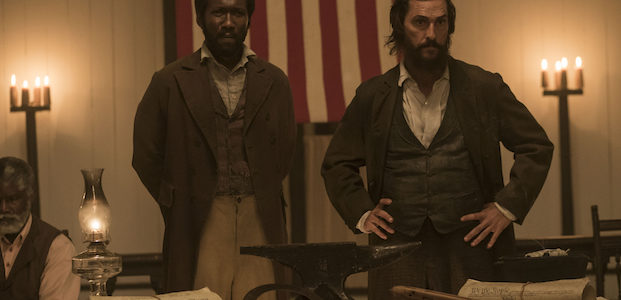
ReelBob: ‘Free State of Jones’
By Bob Bloom
Honor, courage and sacrifice inundate “Free State of Jones” to the point that you may feel dragged into its undertow.
“Free State of Jones,” co-written and directed by Gary Ross (“Seabiscuit”), is based on true events in Mississippi during the Civil War and its aftermath.
How much of the story is true and how much is dramatized is never differentiated, so you may have to do some research to separate fact from fiction.
The movie is so earnest and sincere that you can’t help but admire it. But admire and enjoy are different animals.
At times, the film plays like a dry history lesson, as it makes pains to find parallels to today’s political and social climates.
Matthew McConaughey embodies most of the film’s drawbacks with his portrayal of Newton Knight, the feature’s moral-driven leader who deserts his Confederate regiment after the death of a young kinsman and learns about how rich Southerners were able to evade joining the fight.
He hides in a swamp and slowly gathers a group of like-minded deserters — as well as a handful of runaway slaves. Knight then launches his own rebellion against what he sees as the corrupt Southern officials who are “taxing” his friends and neighbors to the point of starvation.
He and his followers declare the Free State of Jones County, forsaking their allegiance to the Confederacy and establishing a nation of their own.
McConaughey’s Knight is more a symbol than a flesh-and-blood individual. He shares the characteristics of his last name — bearing himself with nobility, wisdom and dignity. He is soft-spoken, yet firm and decisive.
Knight is everything, except a fully conceptualized human being. The script refuses to afford any opportunities to pierce his armor and see inside the man.
Indeed, that is the problem that inflicts the entire cast. Everyone is presented in black and white; they lack shading and complexity. Most of the characters feel as if they were borrowed from a museum exhibition.
The film simply lacks any nuance.
Plus, Ross throws in a distracting subplot — set in 1948 — about a descendant of Knight’s who is on trial for breaking a Mississippi law by marrying a white woman. It seems this young man may have some Negro blood since Knight began a long-term relationship with Rachel (Gugu Mbatha-Raw), a former slave from a nearby plantation, who bore him a child.
The idea was to show parallels between the two time periods, but it fails to achieve its purpose.
While “Free State of Jones” offers some action, it is woefully bogged down in simple and clichéd bromides about freedom and equality.
These are the squirm-in-your-seat-and-check-your-watch moments. And at about 145 minutes, they make the film seem as long as the war itself.
Even McConaughey cannot lift himself out of this bland bog of blathering.
“Free State of Jones” does offer some brutal battlefield sequences, as well as some compelling moments. However, they cannot come together as a whole.
It is as if Ross wanted to cram in as much as he could, and in the process, he allowed his balloon to get so big that it burst.
The movie offers some fine performances, especially by Mbatha-Raw and Mahershala Ali as Moses Washington, a runaway slave who becomes Knight’s friend and companion.
Overall, “Free State of Jones” is too long, too convoluted and rather messy. It lacks a definitive focus and is ill-paced.
Yet, it is a movie I can recommend that you see. It does reveal a little known slice of Civil War history. It is just too bad it could not have done so in a more forceful and exciting manner.
Bloom is a member of the Indiana Film Journalists Association. His reviews appear at ReelBob (reelbob.com) and Rottentomatoes (www.rottentomatoes.com). He also reviews Blu-rays and DVDs. He can be reached by email at bobbloomjc@gmail.com or on Twitter @ReelBobBloom.
FREE STATE OF JONES
2 stars out of 4
(R), graphic and disturbing battlefield images, violence